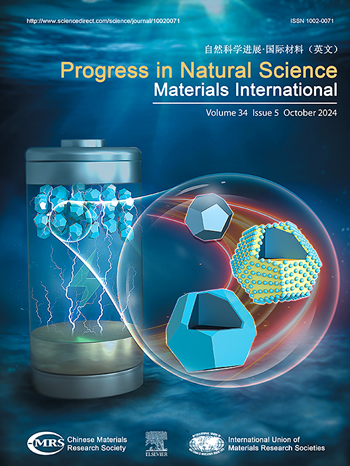Passerini and thiol-ene reactions: A facile, green, and efficient route to high-performance bio-based plasticizers
IF 7.1
2区 材料科学
Q2 MATERIALS SCIENCE, MULTIDISCIPLINARY
Progress in Natural Science: Materials International
Pub Date : 2024-12-01
DOI:10.1016/j.pnsc.2024.10.005
引用次数: 0
Abstract
The increasing global demand for sustainable alternatives to petroleum-based plasticizers, particularly in poly(vinyl chloride) (PVC) products, has intensified the exploration of bio-based options derived from renewable resources such as plant oils. Traditional bio-based plasticizers, while promising, often suffer from limitations such as low molecular weight, high volatility, and poor compatibility with PVC, thereby restricting their practical applications. To surmount this hurdle, we introduce a novel synthetic route combining the Passerini reaction with the thiol-ene click reaction, aimed at producing high-performance plant oil-based plasticizers (POPs) with enhanced ester content and molecular weight. This method offers significant advantages over traditional methods, including low reaction temperatures (≤40 °C), ultrahigh yield (95 %) when using ethanol as the solvent, and precise control over ester content. Furthermore, the key findings demonstrate that the designed and synthesized POP (bio-content, 69 %) produced using this method exhibits outstanding overall performance, such as excellent migration resistance, good compatibility with PVC, and high thermal stability compared to traditional plasticizers. This facile, green, and efficient method may significantly advance the adoption of bio-based plasticizers, establishing them as a viable alternative to petroleum-based counterparts.

帕西尼和巯基反应:一种简便、绿色、高效的高性能生物基增塑剂生产途径
全球对石油基增塑剂的可持续替代品的需求日益增加,特别是在聚氯乙烯(PVC)产品中,这加强了对来自植物油等可再生资源的生物基选择的探索。传统的生物基增塑剂虽然前景广阔,但往往存在分子量低、挥发性高、与PVC相容性差等局限性,从而制约了其实际应用。为了克服这一障碍,我们提出了一种新的合成途径,将Passerini反应与巯基点击反应相结合,旨在生产具有更高酯含量和分子量的高性能植物油增塑剂(pop)。与传统方法相比,该方法具有反应温度低(≤40℃)、以乙醇为溶剂时收率极高(95%)、酯含量精确控制等显著优势。此外,主要研究结果表明,与传统增塑剂相比,使用该方法生产的设计和合成的POP(生物含量69%)具有出色的整体性能,例如出色的迁移性,与PVC的良好相容性以及高热稳定性。这种简便、绿色、高效的方法可能会大大促进生物基增塑剂的采用,使其成为石油基增塑剂的可行替代品。
本文章由计算机程序翻译,如有差异,请以英文原文为准。
求助全文
约1分钟内获得全文
求助全文
来源期刊
CiteScore
8.60
自引率
2.10%
发文量
2812
审稿时长
49 days
期刊介绍:
Progress in Natural Science: Materials International provides scientists and engineers throughout the world with a central vehicle for the exchange and dissemination of basic theoretical studies and applied research of advanced materials. The emphasis is placed on original research, both analytical and experimental, which is of permanent interest to engineers and scientists, covering all aspects of new materials and technologies, such as, energy and environmental materials; advanced structural materials; advanced transportation materials, functional and electronic materials; nano-scale and amorphous materials; health and biological materials; materials modeling and simulation; materials characterization; and so on. The latest research achievements and innovative papers in basic theoretical studies and applied research of material science will be carefully selected and promptly reported. Thus, the aim of this Journal is to serve the global materials science and technology community with the latest research findings.
As a service to readers, an international bibliography of recent publications in advanced materials is published bimonthly.

 求助内容:
求助内容: 应助结果提醒方式:
应助结果提醒方式:


